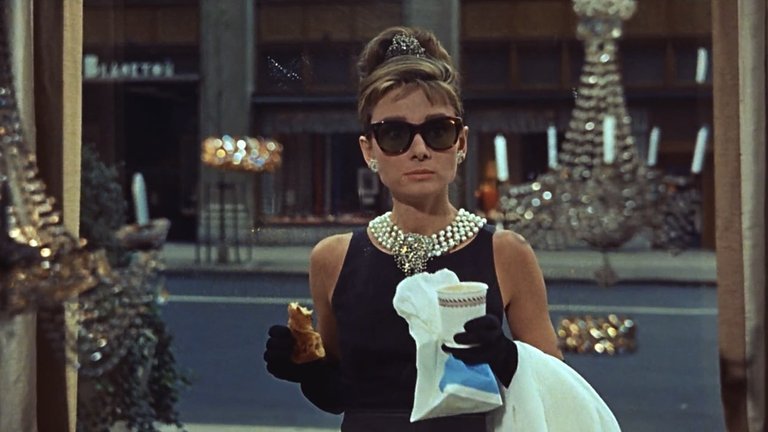Film Review: Breakfast at Tiffany's (1961)

Being iconic and being good are fundamentally different concepts, a distinction that is perhaps best illustrated by Breakfast at Tiffany's, the 1961 film directed by Blake Edwards. This film is celebrated as one of the most iconic films of its era, yet it does not withstand rigorous scrutiny when evaluated as a potential classic of the Seventh Art.
The film is adapted from Truman Capote's 1958 novella. Capote, who would later be recognised as one of the great literary figures of his time, was famously displeased with how Edwards and screenwriter George Axelrod deviated from his source material.
Set in New York City, Breakfast at Tiffany's follows Holly Golightly, portrayed by Audrey Hepburn, an aspiring socialite who relies on various male admirers for financial support. The plot begins with Holly's new neighbour, Paul Varjak (played by George Peppard), an aspiring writer who also engages in sexual relationships for financial gain, specifically with a wealthy older woman named Mrs. Emily Eustace "2E" Failenson (played by Patricia Neal). Paul's fascination with Holly's free-spirited nature leads to a friendship that blossoms into love; however, their potential happiness is jeopardised by Holly's mysterious past and her ambiguous intentions regarding a wealthy Brazilian rancher, José da Silva Pereira (played by José Luis de Vilallonga).
Breakfast at Tiffany's achieved immense commercial success upon its release. It not only performed well at the box office but also garnered critical acclaim, earning several Oscar nominations and winning two: Best Original Soundtrack for Henry Mancini and Best Original Song for the iconic "Moon River." This success can be attributed to its blend of romance, comedy, and drama—elements that resonated with audiences in the 1960s. The film encapsulates the zeitgeist at the start of the decade marked by optimism and cultural dynamism, set against the backdrop of an affluent metropolis in America at the zenith of its power.
Blake Edwards' direction infused Breakfast at Tiffany's with a distinctive sense of style that remains memorable. The film is renowned for its exquisite production design and costumes, particularly Hepburn's portrayal of Holly Golightly. Her signature look—complete with dark sunglasses, a cigarette holder, a quignon hairstyle, and Givenchy’s little black dress—has left an indelible mark on fashion history.
However, this stylishness cannot compensate for the film's fundamental flaws. At its core, Breakfast at Tiffany's suffers from poor writing characterised by a meandering plot and underdeveloped subplots. Elements such as Holly’s troubled childhood and her role as a courier for an imprisoned mafia boss feel underutilised and contribute little to the film. While Axelrod made notable changes to adapt Capote’s work—including transforming the originally gay narrator into a heterosexual protagonist—his efforts were hampered by the constraints of the Motion Picture Production Code. This led to an exploration of “problematic” themes through double entendres rather than direct engagement.
Edwards’ comedic sensibilities often overshadow other aspects of storytelling. His attempts at humour yield mixed results; while some scenes—such as the chaotic party in Holly’s apartment—are brilliantly executed, they also highlight one of the film’s most controversial elements: the character of Mr. Yunioshi. Played by Mickey Rooney in an egregiously insensitive portrayal involving "yellowface," this character epitomises racial stereotyping that many contemporary viewers find objectionable. Rooney’s performance not only exemplifies outdated attitudes but also detracts from the film’s overall impact; even he later sought to distance himself from this role.
In contrast to these shortcomings is Audrey Hepburn’s performance, which shines brightly despite Capote’s initial preference for Marilyn Monroe in the role of Holly Golightly. Hepburn’s interpretation brings depth and charm to her character, making her relatable even as Holly navigates morally ambiguous choices. Despite her reliance on men for financial stability, Holly embodies qualities of independence and assertiveness that were rare for female protagonists in Hollywood during this period. Ironically, her character can be viewed through a feminist lens; some prominent figures in the women’s rights movement have even celebrated her as an icon of empowerment.
Hepburn’s magnetic presence overshadows her co-stars, including George Peppard as Paul Varjak, whose performance often feels lacklustre in comparison. Among the supporting cast, Buddy Ebsen stands out as Holly’s much older rural husband—a role that would later lead him to fame on television in The Beverly Hillbillies.
Ultimately, Breakfast at Tiffany's remains a polarising film that elicits strong reactions from audiences today. While some viewers appreciate its stylishness and charm, others are repelled by its problematic content. Despite these divisions, it is generally regarded as a good film worth recommending—especially to those willing to acknowledge its flaws while appreciating its cultural significance within cinematic history.
RATING: 6/10 (++)
Blog in Croatian https://draxblog.com
Blog in English https://draxreview.wordpress.com/
InLeo blog https://inleo.io/@drax.leo
Hiveonboard: https://hiveonboard.com?ref=drax
Rising Star game: https://www.risingstargame.com?referrer=drax
1Inch: https://1inch.exchange/#/r/0x83823d8CCB74F828148258BB4457642124b1328e
BTC donations: 1EWxiMiP6iiG9rger3NuUSd6HByaxQWafG
ETH donations: 0xB305F144323b99e6f8b1d66f5D7DE78B498C32A7
BCH donations: qpvxw0jax79lhmvlgcldkzpqanf03r9cjv8y6gtmk9
Posted Using InLeo Alpha